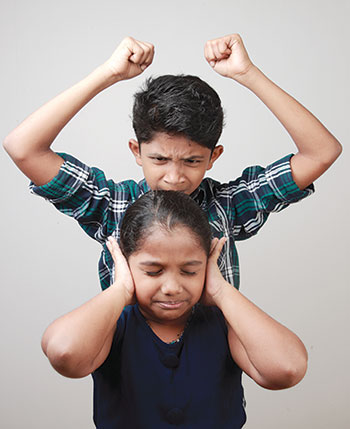
In some cases, sibling rapport can transform into extreme possessiveness. Also when there is a substantial age difference between siblings, the elder child often takes the role of primary caretaker and makes up for her insecurity by tending to the young sibling to earn parental approval and praise. However this is not healthy behaviour. It’s advisable to get help from a counsellor.
My son, a class VII student, is very active, restless and garrulous at home. But in school, he is the exact opposite. He is quiet and uncommunicative. Is this extreme behaviour abnormal? — Lekha Ajaykumar, Calicut
Your son’s behaviour are responses to external stimuli. He is free from discipline at home and subject to it in school. It may be advisable to meet with the school counsellor who can guide you based on inputs from teachers and peers. I also advise that you test him for learning difficulties. Either way, you need to consult a professional counselor. As he is on the verge of adolescence, it’s critical that you address the problem urgently.
My son is seven years old. I always wanted him to learn the violin and realised through a friend’s experience that it is better to start early. I feel this is the correct age but my husband feels it’s too early. He believes that we will be stressing him out. I say that he needs to try it and if he doesn’t like it, he can stop. Please advise. — Jisha Rao, Hyderabad
Many children begin to learn music at the age of six-seven years. However, initially it’s important to emphasise enjoyment of music rather than learning to play. The violin is a difficult instrument to play. So if you stress the importance of learning, he may be put off by the idea. You need to find a good music teacher in your city who specialises in teaching children. A combination of instrumental and vocal music and an opportunity to develop rhythm over the next year will prepare his neural pathways for music learning. When he is ready, you can introduce the violin. In the meantime, he would have had the opportunity to learn the basics of music and will be better prepared to start learning to play an instrument. If he begins with a difficult instrument, he will most likely find it overwhelming and quit. Also please let your child choose the musical instrument he wants to learn. Your desires should not be vicariously lived through your child.
(Aarti Rajaratnam is director of the Child Guidance Centre and Counseling Clinic, Salem/Chennai)